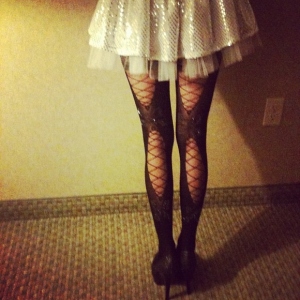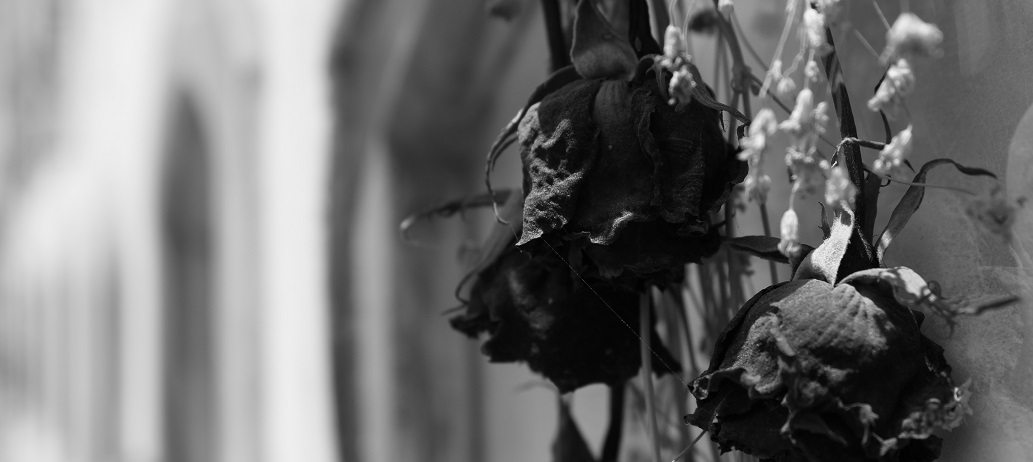I don’t remember which year it was in college, but I think it might have been my senior year, since I was sitting in the balcony for chapel, and I think that was the only year I was ever assigned a seat up there. But, it was before One of the Most Awesome Rule Changes Ever, because I was still wearing hosiery.
Before I go any further, I should probably explain that my undergrad college had a strict dress code– to “encourage professionalism,” as they explained it. Of the few dozen or so rules women had to follow, one of them was that we had to wear panty hose in the morning until chapel at 10a, then again at dinner, to church on Wednesday, and all day on Sunday or during Bible Conference. Most of the time, my skirts were long enough that I could get away with knee-highs, but, sometimes, I wanted to wear a knee-length skirt. I loathed high-waisted panty hose, so my compromise was thigh highs. It never occurred to me, however, to invest in a garter belt. Because, after all, garter belts are “lingerie” and therefore inappropriate for an unwed young woman.
On this particular morning, when I got up along with 4,500 other students to exit chapel, I realized that my thigh highs had given up the Holy Ghost and were slipping down. I did everything I could to keep them from slipping even further– I pinched my legs, wobbling up the stairs with my knees locked together. I tried to take incrementally tiny baby steps to the bathroom, horribly and powerfully and shamefully conscious of the two thousand men swarming around me– and I was on the balcony level, where the seminary classes were immediately following chapel. Men in dark suits started flocking toward me, and the closest bathroom was so far away I knew I wouldn’t make it before my stockings were visible.
When I was just a dozen steps away from a bathroom, a seminary student stopped me.
“Did you know we can all see your . . . your, uhm, underthings?”
In that moment, my embarrassment and humiliation flashed into rage. I wanted to scream, or hit him. Anything. “Yes.” I managed to grit out. I didn’t know if he was a floor-leader or not, and yelling at a floor leader could net me fifty demerits for “disrespect.”
“You need to take care of this right away. You know that by . . . well, by wearing things like those you’re encouraging men to lust after you, right?” His voice was so soft, and gentle– he was speaking the truth in love. Admonishing his sister in Christ, edifying her.
I almost sawed my tongue in half. I was so angry words just kept piling up in my throat and choking me. I merely pointed at the bathroom and kept the rage-fueled tears out of my eyes.
“Oh, oh . . . well, ok.” And he walked briskly away, confident and secure.
When I finally got to the bathroom, I didn’t even make it into a stall before I ripped the stockings off and shoved them into the trashcan. I spent the next hour, my lunch hour, sitting in that empty bathroom and crying.
~~~~~~~~~~~~~~~~~~~~
During some point in graduate school, one of my friends got engaged– and the engagement pictures appeared on facebook. They’re an extraordinarily beautiful couple– seriously, his fiancé is one of the most gorgeous women I’ve ever met. The pictures were all lovely, especially since he’d hired a photographer to take pictures of the proposal, and you could see the surprise and delight on her face when he got down on one knee.
One of the shots the photographer managed to get was her throwing herself into his arms after she’d said yes– and her arms lifted the bottom hem of her adorable dress up high enough that you could see the top of her lace-edged thigh highs.
My immediate, instantaneous, gut reaction was to frown in disapproval. Her dress was too short– if you can’t make simple gestures like hugging someone without showing off your sexy under garments to the world, you need to rethink that clothing choice.
But, there was a voice inside of me, a tiny, hushed voice I did my best to crush into silence. But it’s a beautiful picture. Intimate. And sexy. A sliver of myself I’d been taught to squash my entire life envied her and her ability to wear black-lace thigh highs. I wanted to wear something–anything–made out of black lace. And yes, I wanted to wear something with the Parisian flair she’d cultivated, and have pictures of me biting my rogue-painted lip and peeking out from under a fedora.
I clicked through to the next picture and did my best to forget all about it.
~~~~~~~~~~~~~~~~~~~~
Me and my husband honeymooned in Chicago. It was only a five-hour train ride from Ann Arbor, where we were married, and it was a destination that fit our pace. We like museums, and pizza, and symphonies, and Chicago has plenty. Oh, and pancakes. If you’re ever in Chicago, you must visit Wildberry Café. I swear, best pancakes I’ve ever had in my life. And that’s saying something, since my mother and grandmothers make incredible pancakes.
For one of our evenings out, we went to the original Cheesecake Factory and then went to see Les Misérables. I wore a stunningly beautiful ruched black-and-white damask print dress, knee-high slouchy suede boots, and, yes, black lace-edged thigh highs. On our walk to the restaurant, the dress rode up a little bit, and you could see the top of my thigh-highs. I looked down at one point and noticed the lace peeking out–just barely, and I stopped in the middle of a crowded sidewalk.
Burning-hot pain knifed through me, and I had to fight not to gasp out loud.
I tugged my dress back down and kept walking, trying to keep the boiling red flush out of my face. But, my dress kept riding up, and I had to keep stopping to tug it back down. After the fifth time, Handsome stopped me. “What are you doing?”
“You can see my thigh-highs!” I whisper-yelled back at him.
“So?”
I stared at him, shocked, and the crazed and panicked busyness of my thoughts blanked out. “What?” I was baffled. What does he mean, “so”?
“What does it matter? No one cares. I don’t care. You’re gorgeous, and beautiful.” And he kissed me, right in the middle of the sidewalk. I was too stunned to really kiss him back.
And suddenly, just like that, I was laughing. Because he was right– none of it mattered the least bit.





